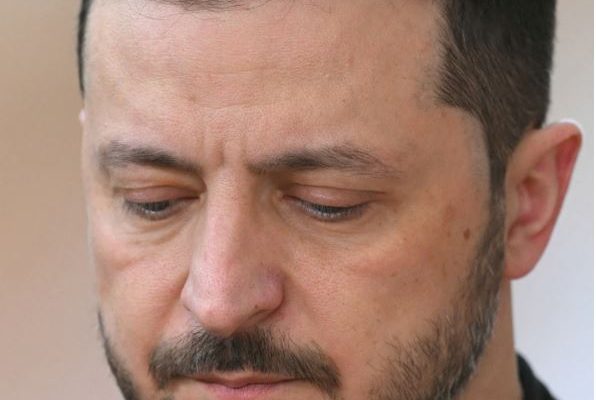KYIV — One week after Volodymyr Zelensky gambled on a confrontational strategy with President Donald Trump and wound up at the center of an explosive Oval Office meeting, the Ukrainian president is scrambling to restore ties with Washington as the White House ramps up pressure for a quick end to the war with Russia.
On Friday, after Russia launched a massive missile and drone attack against Ukraine, Trump said he would consider imposing new “large-scale” sanctions and tariffs against Moscow until a ceasefire and final agreement were reached.
The rare threat against Russian President Vladimir Putin suggested Zelensky’s outreach might be working. But hours later, Trump appeared to reverse course again, apparently condoning Russian attacks and reiterating his claim that Kyiv’s position was weak.
Zelensky, who has led Ukraine through more than three years of all-out war with Russia, is now facing one of the most politically perilous moments of his presidency. Since the Oval Office blowup, Trump has postponed signing a mineral deal with Kyiv, paused military support to its armed forces and further limited intelligence-sharing with its government — moves that only help Russia on the battlefield.
For many, Zelensky’s willingness to stand up to Trump and Vice President JD Vance demonstrated his resolve and courage as his country’s once-staunchest ally abruptly recast itself as merely a neutral mediator in the devastating war. Ukrainian trust in Zelensky shot up from 57 to 67 percent in the three weeks since tensions between Kyiv and Washington began escalating, a poll released Friday showed.
But others believe the disastrous meeting triggered retaliation from Trump and that the trip itself — scheduled amid mounting tensions between the two leaders — was a major misstep.
The big test for Zelensky will be whether he can repair his relationship with the White House while maintaining support at home as he tries to appease Trump without being backed into a deal that compromises Ukrainian security and sovereignty.
The ‘letter’ to Trump
On Tuesday, hours before Trump addressed Congress, Zelensky posted a long message on X, in which he reaffirmed Ukraine’s commitment to peace, described the White House meeting as “regrettable” and suggested a partial ceasefire as an initial step to peace talks.
“You can clearly see that he tried and tries to bridge the gap,” another Ukrainian official said.
Like others in this article, the officials spoke on the condition of anonymity to talk candidly about a sensitive political moment in the country.
Trump described the post as “a letter” in his address before the joint session of Congress later that night and held back from bashing Zelensky — sending waves of relief through the presidential office in Kyiv, according to several people familiar with the matter. Washington and Kyiv have since scheduled a meeting of delegations in Saudi Arabia for initial peace talks next week, suggesting relations are at least somewhat mended.
In the week since the blowup, Zelensky does not appear to have made the situation worse, “which is a big achievement,” said one former Ukrainian official. “The major requirement for any politician these days is not to do something ultimately stupid.”
Such sanctions could have weakened Zelensky even more than aid cuts, the former official and a lawmaker said, in part because if Washington did so by accusing anyone in his inner circle of ties to corruption schemes, he could quickly lose the European backing that has only become more crucial in recent days.
Even if Zelensky has taken a cautious approach since his Washington trip, Gen. Valery Zaluzhny, his former top military commander who now serves as ambassador to Britain, has not. Zaluzhny, who is widely seen as a top contender to run against Zelensky in future elections, blasted Washington in remarks at the Chatham House think tank in London on Thursday, saying “the United States is destroying the world order.”
His bluntness suggested that despite longtime tension between the men, there is at least some sense of unity between them in the face of a dramatic shift from a key partner.
Making ties great again
Still, concerns remain over how and whether Zelensky can persuade Washington to rejoin Ukraine’s cause.
“What Trump wanted was to confirm Ukraine was ready for negotiations and to sign the deal. He also wanted to show he’s not [President Joe] Biden — he’s not giving anything for free,” Taruta said. “He’s taking a more business approach. Zelensky should have followed this approach.”
With Washington seeking to play the role of mediator, it appears “Trump will make history as the leader who stopped the war — but at the cost of Ukraine,” Taruta said.
To try to salvage the situation, he said, Zelensky must empower a broad coalition in parliament and “appoint a person for negotiations with huge expertise, especially in conflict.”
“It was a cold shower for him in London,” the lawmaker added, referring to Zelensky’s subsequent trip to Britain. There, despite a public show of warmth, partners warned Zelensky: “We will help you, definitely, but you need to go back to the United States and talk to them and say sorry. … We simply don’t have the ability to replace all assistance you have from them.”
In Ukraine, there are worries that Europeans’ good intentions cannot replace the bulwark Washington once provided.
Fears on the front
Among soldiers, especially, there are growing fears that Trump’s apparent lack of interest in aiding Ukraine could result in a deal that will only strengthen Russia’s military and help prepare Moscow for another war very soon.
Vladyslav, a military officer in Ukraine’s 241st brigade, who spoke on the condition that only his first name be used, in adherence to military rules, said the outburst in the Oval Office emerged for Washington as “a beautiful pretext to implement its strategy, where Trump needs a quick peace.”
He acknowledged that Ukraine is facing “very tough times at the front” but said he fears that Russian demands to eliminate the possibility of a NATO membership and weaken Ukraine’s army, among other measures, amount to “not just capitulation but complete humiliation.”
Until last week, he said, he had expected the war might be coming to an end in which Moscow and Kyiv would both be forced to make concessions, and that despite territorial and human losses, Ukraine would be able to rebuild without the threat of future attacks. He thought he might even get to demobilize after years on the front — hopes that have since disappeared.
“Putin cannot be trusted, and I don’t understand Trump’s political strategy,” he added. “Ukraine must continue to fight. We cannot give in. … If we concede even a little, they will take everything. We must win peace on our own terms.



